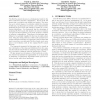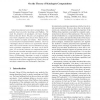450 search results - page 58 / 90 » Algorithmic uses of the Feferman-Vaught Theorem |
ICCAD
2002
IEEE
14 years 5 months ago
2002
IEEE
In this survey, we outline basic SAT- and ATPGprocedures as well as their applications in formal hardware verification. We attempt to give the reader a trace trough literature and...
GECCO
2008
Springer
13 years 10 months ago
2008
Springer
The No-Free-Lunch theorem is a fundamental result in the field of black-box function optimization. Recent work has shown that coevolution can exhibit free lunches. The question a...
ICML
2004
IEEE
14 years 9 months ago
2004
IEEE
Synchronous reinforcement learning (RL) algorithms with linear function approximation are representable as inhomogeneous matrix iterations of a special form (Schoknecht & Merk...
COCO
2007
Springer
14 years 3 months ago
2007
Springer
Valiant has proposed a new theory of algorithmic computation based on perfect matchings and Pfaffians. We study the properties of matchgates—the basic building blocks in this n...
ICML
2004
IEEE
14 years 9 months ago
2004
IEEE
Kernel conditional random fields (KCRFs) are introduced as a framework for discriminative modeling of graph-structured data. A representer theorem for conditional graphical models...


